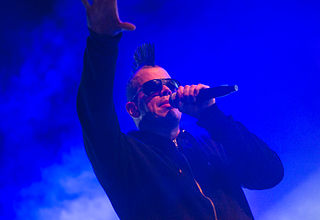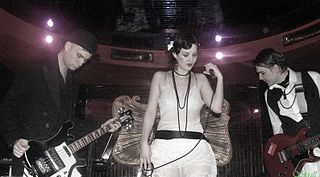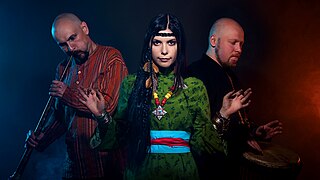
Feindflug is a German electro-industrial band founded in 1995 by DJ Felix and DJ Banane. Translated, der Feindflug corresponds in military use to the French/English word "sortie".

Melotron is a futurepop and synthpop band from Germany. In 1995 Andy Krueger, Edgar Slatnow and Kay Hildebrandt left their former band, The Vermin, to form Melotron. The band found success with their first single, "Dein Meister," in 1998. Their 2007 single "Das Herz" charted at no. 81 in the German mainstream charts.
Pronoian Made was an alternative rock/gothic metal band from Luxembourg which gained notoriety for being the first to play gothic influenced rock in the country, and also for being the first to succeed beyond national borders.

Gothminister is a Norwegian gothic and industrial metal band. Formed in 1999, they released seven studio albums and gained success in Germany. They played in several German music festivals, including Wave-Gotik-Treffen (WGT), the Dark Storm Festival and the M'era Luna Festival, and performed in front of over 10,000 people at the Schattenreich Festival.

Dandelion Wine are a musical trio based in Melbourne, Victoria, Australia. The band combines medieval and Middle Eastern instruments with electronic beats, analogue synths, female vocals and swirling guitars. Their music incorporates elements of ethereal, medieval, world music, dream pop, electronica and darkwave.
Love Like Blood was a German gothic rock band. The band's name comes from the song of the same name by English post-punk band Killing Joke.

Sami Mark Yahya, professionally known by his stage name Faderhead or also under the pseudonym Sam Nordmann, is a German electronic music producer and vocalist from Hamburg, Germany.

Komu Vnyz is a Ukrainian rock band founded in 1988. Komu Vnyz's music is a blend of gothic and industrial styles, combined with the lyrics of ancient Ukrainian legends.

Katzenjammer Kabarett is a French four-piece dark cabaret band from Paris, France. Aesthetically inspired by German Weimar-era cabarets and burlesque shows, the band's name is of German origin and literally translates to "cat's wail cabaret"; Katzenjammer also generally means "discordant sound" and is used as a synonym for a hangover. The band's other stylistic influences include Dadaism, Futurism, Symbolism and Postmodernism.
Ukrainian Gothic Portal is a printed magazine, web-portal and promotion agency of gothic / dark / electro scene in Ukraine, Russia and Belarus. UGP was established in 1999 on basis of unofficial closed subculture formation Kiev Gothic Clan (KGC) and was officially registered in 2000 on the domain gothic.com.ua. The founder and ideologist of UGP was the author of gothic-related publications, Vitaliy Stranger. In 2000–2005, UGP became one of the leading dark music-related agencies in Ukraine and Russia, covered by local and international press, organizing festival "Deti Nochi: Chorna Rada", publishing printed magazine "Gothica", releasing cds on label "Tridens", making its own radio program and TV appearances. Cooperation partners of UGP became such festivals as Wave-Gotik-Treffen, Castle Party, such magazines as Zillo, Orkus and other organizations in Europe. The aims of UGP were the creation, development and coverage of gothic / dark / electro scene in Ukraine and in all countries of ex-USSR as well as uniting scene-fans and admirers of respective aesthetics.
Modulate is the studio project of Manchester-based DJ Geoff Lee. They are an Electronic dance music group from Manchester, England. Their sound blends elements of various styles including Electro, Rave, Industrial music, Trance music and Hard dance. The band is signed to Metropolis Records and Infacted Recordings (Europe/RoW). Modulate live shows also features Steve Wilkins

Theodor Bastard is a band, from St Petersburg, Russia. Theodor Bastard were pioneers of world and neofolk music genres in Russia. Also elements of dark wave, trip hop and ambient are present in the band's music. The themes of band's songs are very far from everyday problems, they are based on mythology and fantasy. The hallmark of the band is a female vocal by Yana Veva – the lead vocalist and author of many songs. She often sings in idiosyncratic language invented by her and in rare languages ranging from African and Asian to Native American and many more. Theodor Bastard albums were released in 5 countries: Russia, Germany, Turkey, Mexico, Argentina.
Dolls of Pain is a dark electro band from France founded in 2003. It performs primarily in English.

Morlocks is an alternative/industrial rock band formed in Gothenburg, Sweden in the early 1990s by J.Strauss and Н.М.Д.
Eden is a dark wave band that was formed in Melbourne, Australia, in 1987, by Sean Bowley, Pieter Bourke and Ross Healy.

Sixth June are an audio/visual project from Berlin with origins in Belgrade, formed in 2007 by visual artist Laslo Antal and actress Lidija Andonov. All their releases have seen the pair explore multiple sides to their dark cinematic post new wave sound.

Stoneman is a rock band founded in 2004 from various areas of Switzerland. With the release of their fourth album in 2014, the band underwent a change in style from English-language gothic rock to Neue Deutsche Härte.

Nachtblut is a German gothic/melodic black metal band formed in Osnabrück in 2005. They signed a deal with Napalm Records for their third album. In 2013 they performed during Wacken Open Air and Summer Breeze Open Air. In 2014, 2017, and 2022 Nachtblut lined up Wave-Gotik-Treffen festival in Leipzig. To date, Nachtblut has released six studio albums. In October 2020 Nachtblut released their sixth album called Vanitas. Vanitas had 500 special edition wooden boxes with playing Cards, leather wrist band, a Satanic certificate in addition to the album itself.
Cygnosic, stylized CYGNOSIC, is a Greek electronic music project created by musician and programmer, Georgios Psaroudakis. His music is associated with musical genres including Dark Electro/Industrial/EBM. The music is recognizable and consists of characteristic melodic sounds combined with death metal vocals. The studio project is a one-man operation based in Athens, Greece.
















